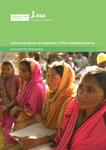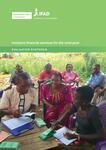Page Header
IFAD's Support to Scaling Up of Results
Overview
IFAD defines scaling up as "expanding, adapting and supporting successful policies, programmes and knowledge, so that they can leverage resources and partners to deliver larger results for a greater number of rural poor in a sustainable way". This synthesis reviews how IFAD's business model and project cycle match scaling-up aspirations. It provides a review of past evaluations and other IFAD documents, drawing lessons and identifying factors of success and risk in IFAD's support to scaling up of results. In the IFAD project cycle, scaling up requires attention at design (the need to keep the project scope focused) and during implementation (the need for better analysis of progress, results, and scalability prospects and constraints). Continued engagement beyond project completion is needed as well, to fine-tune promising interventions and to preserve the quality of their design and implementation from risks associated with pressures for high disbursement and outreach. As recommended by this synthesis, in order to enhance scaling-up opportunities, it will be important for IFAD to sharpen country strategies as well as the project development and implementation cycle, build stronger consensus among operational staff, and refine the definition of its corporate scaling-up targets and methods for verification.Report Details
| Year Published | |
| Type | |
| Joint | No |
| Partner/s | N/A |
| Consultant name | |
| Agency Focal Point | Fabrizio Felloni |
| Focal Point Email | f.felloni@ifad.org |
| Managed by Independent Evaluation Office | Yes |
YOU 'RE READING
IFAD's Support to Scaling Up of Results











